新视野英语第一次复习范围(1)
- 格式:doc
- 大小:190.00 KB
- 文档页数:31
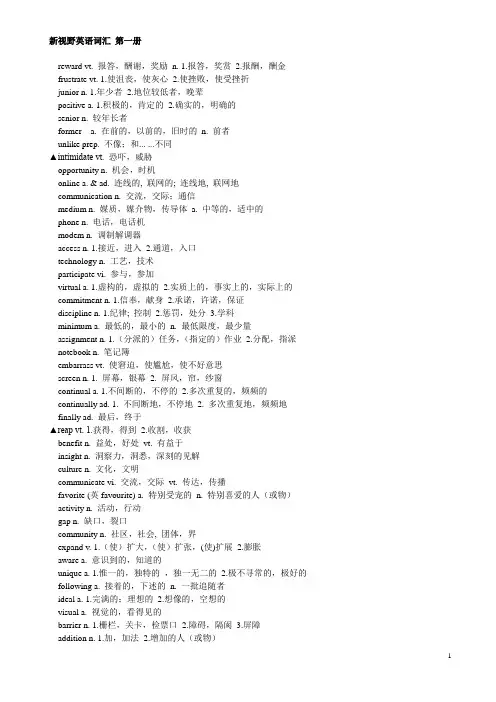
新视野英语词汇第一册reward vt. 报答,酬谢,奖励n. 1.报答,奖赏2.报酬,酬金frustrate vt. 1.使沮丧,使灰心 2.使挫败,使受挫折junior n. 1.年少者2.地位较低者,晚辈positive a. 1.积极的,肯定的 2.确实的,明确的senior n. 较年长者former a. 在前的,以前的,旧时的n. 前者unlike prep. 不像;和... ...不同▲intimidate vt. 恐吓,威胁opportunity n. 机会,时机online a. & ad. 连线的, 联网的; 连线地, 联网地communication n. 交流,交际;通信medium n. 媒质,媒介物,传导体a. 中等的,适中的phone n. 电话,电话机modem n. 调制解调器access n. 1.接近,进入2.通道,入口technology n. 工艺,技术participate vi. 参与,参加virtual a. 1.虚构的,虚拟的 2.实质上的,事实上的,实际上的commitment n. 1.信奉,献身 2.承诺,许诺,保证discipline n. 1.纪律; 控制2.惩罚,处分3.学科minimum a. 最低的,最小的n. 最低限度,最少量assignment n. 1.(分派的)任务,(指定的)作业2.分配,指派notebook n. 笔记簿embarrass vt. 使窘迫,使尴尬,使不好意思screen n. 1. 屏幕,银幕2. 屏风,帘,纱窗continual a. 1.不间断的,不停的2.多次重复的,频频的continually ad. 1. 不间断地,不停地2. 多次重复地,频频地finally ad. 最后,终于▲reap vt. 1.获得,得到2.收割,收获benefit n. 益处,好处vt. 有益于insight n. 洞察力,洞悉,深刻的见解culture n. 文化,文明communicate vi. 交流,交际vt. 传达,传播favorite (英favourite) a. 特别受宠的n. 特别喜爱的人(或物)activity n. 活动,行动gap n. 缺口,裂口community n. 社区,社会, 团体,界expand v. 1.(使)扩大,(使)扩张,(使)扩展2.膨胀aware a. 意识到的,知道的unique a. 1.惟一的,独特的,独一无二的2.极不寻常的,极好的following a. 接着的,下述的n. 一批追随者ideal a. 1.完满的;理想的 2.想像的,空想的visual a. 视觉的,看得见的barrier n. 1.栅栏,关卡,检票口2.障碍,隔阂 3.屏障addition n. 1.加,加法 2.增加的人(或物)reflect v. 1.深思,考虑,反省 2.反映, 体现 3.反射,显示environment n. 环境,周围状况,自然环境critical a. 1.决定性的,关键性的,危急的 2.批评的,批判的ability n. 能力,本领, 才能,才智perspective n. 视角,观点,想法peer n. 同龄人,同等地位的人instruct vt. 1.指示,命令;通知2.教育,指导instructor n. 教师;指导者arise vi. 1.产生;出现;发生 2.(由... ...)引起,(由... ...)产生,起源于 3.起身,起床absolute a. 十足的,地道的absolutely ad. 十足地,地道understanding n. 1.理解力2.谅解reinforce vt. 增强,加强,加固requirement n. 要求,必要条件; 需要,需要的东西likely a. 可能的,有希望的ad. 可能地commit vt. 1.使用; 用于2.犯(错误、罪行等),干(蠢事、坏事等) 3.使承担义务,使承诺input n. 输入,投入essential a. 必不可少的,绝对必要的,非常重要的n. 要素,要点challenge vt. 1.对... ... 质疑,对... ... 怀疑 2.向... ... 挑战normally ad. 通常,正常地sequence n. 1. 连续,一连串 2. 次序,顺序sequential a. 连续的vital a. 1.极其重要的2.有生命的,充满生机的effective a. 1.有效的,生效的,起作用的2.效果好的, 给人印象深刻的weekday n. 工作日(星期六、日以外的日子)click vi. 发出"嘟"、"咔嗒"等轻微响声n. 咔嗒声blast v. 1.发出猛烈响声2.爆破3.以炸药攻击forth ad. 出来; 向前horrible a. 可怕的;令人不悦的stuff n. 东西;材料rhythm n. 节奏; 韵律▲weird a. 古怪的;离奇的definitely ad. 当然;无疑地powerful a. 1.有力的,强壮的 2.功效大的youngster n. 青少年; 青年musician n. 音乐师offensive a. 1.极讨厌的,令人作呕的2.攻击性的disturb vt. 1.打扰, 妨碍2.使不安,使烦恼grab vt. 抓取,攫取thorough a. 1.彻底的 2.认真的thoroughly ad. 仔细地;彻底地bang v. (使)撞击;(使)猛击, 使劲敲hustle vt. 催促;赶towel n. 毛巾■T-shirt n. 圆领衫jeans n. 牛仔裤wrap vt. 包,裹sweater n. (羊)毛衣■makeup n. 化妆品toast n. 烤面包instrument n. 1.乐器2.工具■yah interj. 表示讨厌、嘲笑、无耐心等发出的惊叹语disgust vt. 使厌恶,使反感disgusting a. 令人厌恶的,令人作呕的blouse n. 女衬衫▲closet n. 壁柜▲bug vt. 令人生气;使人烦;纠缠■eye-liner n. 眼线(笔)annoy n. 使生气; 使恼怒■tattoo n. 纹身pierce v. 穿洞; 刺穿,刺破bolt vi. 冲出去,逃跑vt. 闩,拴住▲sip v. 啜,呷,小口地喝,抿honey n. 1.亲爱的,宝贝2.蜂蜜upset a. 不安的,担心的;不舒服的vt. 使心烦意乱,使苦恼,使不适; 使(人)不安knot n. 1.肿块, 节疤2.结awful a. 糟糕的,极坏的fashion n. 时尚old-fashioned a. 不时髦的;陈旧的,过时的tune n. 调子;曲调;旋律tuneless a. 无旋律的;不动听的◆lyric n. 歌词; 抒情诗repeatedly ad. 反复地,一次又一次appeal vi. 1.吸引, 有吸引力, 有感染力2.呼吁,恳求rid vt. 从...中清除, 使摆脱,解除...的负担▲distract vt. 分散注意力, 转移注意力,使分心section n. 部分lucky a. 幸运的, 侥幸的,吉利的teenager n. 青少年brow n. 1. 眉,眉毛 2. 额◆eyebrow n. 眼眉identity n. 身份;本体▲defy vt. (公然)违抗,藐视; 挑,激▲expel vt. 把......除名,把......开除; 驱逐,赶走,放逐permanent a. 永久(性)的,固定的radical a. 彻底不同的,完全不同的, 根本不同的n. 激进分子; 激进派painful a. 悲伤的;痛苦的identify vt. 1.认出,鉴定出 2.使与……相连negative a. 1.不好的;负面的 2.否定的influence n. 影响, 影响力vt. (产生)影响concern n. 1.关心;担心2.关切的事,有关的事vt. 使不安;使担心anyway ad. 不论怎么,不管怎么说▲moan vi. 1.呻吟 2.抱怨,发牢骚appointment n. 约会▲briefcase n. 公文包mature v. (使)成熟;(使)长成a. 长大了的;成熟的rebel vi. 反抗;反对, 反叛patience n. 耐心, 忍耐anchor n. 1.锚 2.可依靠的人或物lean vi. 1.倚;靠2.倾斜;倾向;偏向balance n. 1.平衡;均衡2.均势, 平衡v. 1.(使) 平衡, (使) 均衡2.权衡;比较severe a. 1.非常恶劣的;紧张的;困难的2.严格的;严肃的;严厉的severely ad. 严格地;严厉地;非常恶劣地▲cripple vt. 1.使跛;使残废 2.严重地损坏;削弱n. 伤残人(或动物)inward a. 1.在内的;内部的(尤指在头脑中、精神上)2.向内的inwardly ad. 内心或精神方面coordinate vt. 使协调halt v. 暂停;中断;中止n. 暂停;中断;中止impatient a. 1.不能冷静地对待或等待的;易烦躁的;不耐心的 2.急切的;渴望的pace n. 1.(尤指走或跑的)速度 2.进步或发展的速度(尤指某项活动的速度)vi. 踱步, 慢步走adjust v. 1.使适应(新环境);适应2.调整;校准;调准subway n. 1.(城市中的)地下铁道2.(尤指马路或铁路下方的)地下通道;人行隧道despite prep. 尽管; 不管▲nasty a. 1.令人不快的;令人厌恶的2.不友善的;恶意的wagon n. 1.儿童手推车 2.四轮运货马(牛)车 3.铁路货车(或客车) 车厢▲cling vi. 1.抱住;抓紧 2.坚持;坚守;拒不放弃;抱定rail n. 1. [C]横挡;栏杆;护栏2. [C](火车或电车的)铁轨hand-rail n. [C] (楼梯等的)扶手tunnel n. 地下通道;(为公路或铁路穿过山岭河流或海底的)隧道▲basement n. 地下室amaze vt. 使大为惊讶;使惊愕stress n. 1.(由于精神、体力不适或困境等造成的)压力;忧虑;紧张2.强调;重视vt. 1.强调, 重视2.重读, 读重音complaint n. 1. 抱怨;诉苦 2.控告;投诉;抱怨envy n. 妒忌;羡慕vt. 羡慕;妒忌envious a. 嫉妒的;羡慕的owner n. 物主;所有人precise a. 1.精确的;准确的;明白的;无误的 2.正好;就在precisely ad. 准确地;精确地;正好;恰恰engage v. 1.(使)从事;(使)忙于2.雇用;聘用3.使全神贯注;引起(注意);占用(时间)local a. 地方的;当地的;本地的n. 当地人,本地人baseball n. 棒球运动;棒球occasion n. 1.(事件发生的)特定时刻;时机2.(适当的)时机;机会punch v. 1.用拳猛击2.用打孔机打孔▲shove vi. 推;挤;撞aid n. 帮助;援助;救护vt. 帮助, 援助unaided a. 无助的;独力的kid v. 1.开玩笑2.欺骗;哄骗n. 小孩或年轻人urge vt. 1.力劝2. 鼓励;催促;鞭策n. 强烈愿望, 迫切需求dive n. 1.(美俚)(拳击中)假装被击倒2.跳水vi. 跳水, 潜水navy n. 1.(一国的)海军 2.一个国家的军舰及其全体官兵reluctant a. 不愿意的;迟迟不合作的;不同意的reluctance n. 不愿;勉强worthy a. 1.值得尊敬的;值得考虑的 2.值得......的;应......的;足以......的unworthy a. 1.不值得的;不配的 2.(与......的身份、资格、性质)不适合的;不相称的complain vi. 抱怨;诉苦▲trifle n. 无价值的或不重要的东西、问题、行动、琐事、小事v. 轻视, 小看elderly a. (指人)年龄相当大的;中年以上的collapse vi. 1.(指人)病倒;累倒;昏倒2.倒塌;塌陷n. 1.倒塌, 塌陷2.昏倒; 崩溃ambulance n. 救护车county n. 1.(美国及其他国家)郡;县(州以下的行政区分) 2.(英国最大行政单位)郡locate vt. 1.确定......的位置;找出......的位置2.(尤用于被动语态)位于emergency n. 紧急事件;紧急情况emergency-room n. (医院) 急诊室marine n. 海军陆战队的军官或士兵a. 1.海里的, 海生的2.海运的, 海事的apparent a. 1.明显的;显而易见的 2.外表的;表面上的;假的apparently ad. 外表上;表面上;看上去像▲corps n. 军(由两个或两个以上的师组成)vehicle n. 陆上交通工具、车辆▲marsh n. 沼泽(地带);湿地military a. 军人的;军用的;陆军的;军事的;军队的sole a. 1.惟一的;独一无二的;仅有的 2.(某人或某公司)专用的;独占的;不公用的enable vt. 1.(通过授予必要的权利和手段)使能够;使可以2.使成为可能dusk n. 黄昏;薄暮lobby n. 门廊;门厅;接待室dim a. 1.(指眼睛、视力)看不清楚的 2.微暗的;朦胧的dimly ad. 模糊地;朦胧地oxygen n. 氧;氧气extend v. 1.伸开;展开(身体或四肢) 2.使(在空间或时间上)伸展;扩大;加大▲limp a. 1.无力的;没精神的 2.柔软的;软弱的vi. 一瘸一拐地走squeeze v. 1.压;挤;榨;紧握2.用力使进入(通过)狭窄或有限的空间;挤入;挤过▲ward n. 1.病房 2. (尤指小孩)受监护人;受保护人occasional a. 1.偶尔的;偶然的;不经常的 2.应时的、应景的occasionally ad. 偶然地;有时tank n. 1.(盛液体或气体的)大容器;大箱;大罐 2.坦克laughter n. 笑;笑声staff n. 1.工作人员2.掌权的人;做管理工作的人(与学生和工人相对)exchange vt. 1.交换;互换;交流 2.交换inform v. 1.通知;告诉;报告 2.控告sympathy n. 同情;怜悯interrupt vt. 1.打扰(通过插话或其他形式的干扰,打断某人的谈话或其他正在发生的事情。
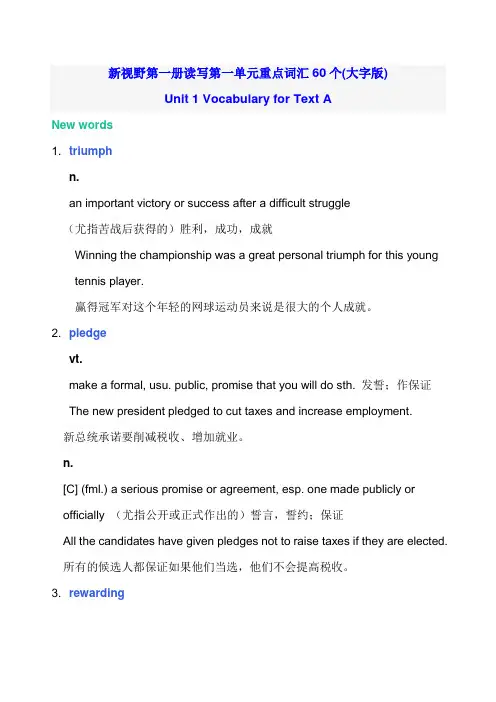
新视野第一册读写第一单元重点词汇60个(大字版)Unit 1 Vocabulary for Text ANew words1. triumphn.an important victory or success after a difficult struggle(尤指苦战后获得的)胜利,成功,成就Winning the championship was a great personal triumph for this young tennis player.赢得冠军对这个年轻的网球运动员来说是很大的个人成就。
2. pledgevt.make a formal, usu. public, promise that you will do sth. 发誓;作保证The new president pledged to cut taxes and increase employment.新总统承诺要削减税收、增加就业。
n.[C] (fml.) a serious promise or agreement, esp. one made publicly or officially (尤指公开或正式作出的)誓言,誓约;保证All the candidates have given pledges not to raise taxes if they are elected. 所有的候选人都保证如果他们当选,他们不会提高税收。
3. rewardingadj giving you satisfaction, pleasure, or profit 值得的;有意义的;有回报的Our journey to the orphanage (孤儿院) was a very rewarding experience.我们的孤儿院之行非常有意义。
Antonym: unrewarding Synonym: satisfying4. posevi.sit or stand somewhere so that sb. can take a photograph of you or painta picture of you(为照相或画像而)摆姿势The leaders posed briefly for photographs before entering the conference room. 领导们进入会议室之前匆匆地摆个姿势拍照。
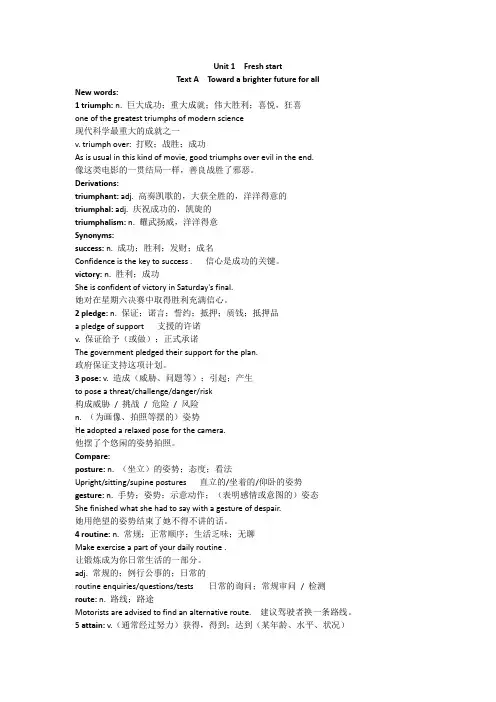
Unit 1 Fresh startText A Toward a brighter future for allNew words:1 triumph: n. 巨大成功;重大成就;伟大胜利;喜悦,狂喜one of the greatest triumphs of modern science现代科学最重大的成就之一v. triumph over: 打败;战胜;成功As is usual in this kind of movie, good triumphs over evil in the end.像这类电影的一贯结局一样,善良战胜了邪恶。
Derivations:triumphant: adj. 高奏凯歌的,大获全胜的,洋洋得意的triumphal: adj. 庆祝成功的,凯旋的triumphalism: n. 耀武扬威,洋洋得意Synonyms:success: n. 成功;胜利;发财;成名Confidence is the key to success . 信心是成功的关键。
victory: n. 胜利;成功She is confident of victory in Saturday's final.她对在星期六决赛中取得胜利充满信心。
2 pledge: n. 保证;诺言;誓约;抵押;质钱;抵押品a pledge of support 支援的许诺v. 保证给予(或做);正式承诺The government pledged their support for the plan.政府保证支持这项计划。
3 pose: v. 造成(威胁、问题等);引起;产生to pose a threat/challenge/danger/risk构成威胁/ 挑战/ 危险/ 风险n. (为画像、拍照等摆的)姿势He adopted a relaxed pose for the camera.他摆了个悠闲的姿势拍照。
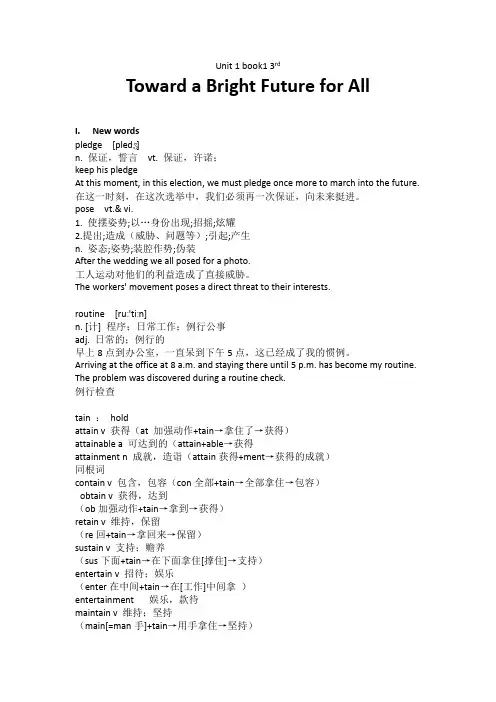
Unit 1 book1 3rdToward a Bright Future for AllI.New wordspledge [pledʒ]n. 保证,誓言vt. 保证,许诺;keep his pledgeAt this moment, in this election, we must pledge once more to march into the future. 在这一时刻,在这次选举中,我们必须再一次保证,向未来挺进。
pose vt.& vi.1. 使摆姿势;以…身份出现;招摇;炫耀2.提出;造成(威胁、问题等);引起;产生n. 姿态;姿势;装腔作势;伪装After the wedding we all posed for a photo.工人运动对他们的利益造成了直接威胁。
The workers' movement poses a direct threat to their interests.routine [ruː'tiːn]n. [计] 程序;日常工作;例行公事adj. 日常的;例行的早上8点到办公室,一直呆到下午5点,这已经成了我的惯例。
Arriving at the office at 8 a.m. and staying there until 5 p.m. has become my routine. The problem was discovered during a routine check.例行检查tain :holdattain v 获得(at 加强动作+tain→拿住了→获得)attainable a 可达到的(attain+able→获得attainment n 成就,造诣(attain获得+ment→获得的成就)同根词contain v 包含,包容(con全部+tain→全部拿住→包容)obtain v 获得,达到(ob加强动作+tain→拿到→获得)retain v 维持,保留(re回+tain→拿回来→保留)sustain v 支持;赡养(sus下面+tain→在下面拿住[撑住]→支持)entertain v 招待;娱乐(enter在中间+tain→在[工作]中间拿)entertainment 娱乐,款待maintain v 维持;坚持(main[=man手]+tain→用手拿住→坚持)maintenance n 维护;坚持comprehensive adj. 综合的;广泛的;有理解力的comprehensive evaluation 综合评价,综合评价法comprehensive analysis 综合分析fascinatingfascinate ['fæsineit] vt.1. (用个人的魅力、独特的能力等等)迷住;使着迷;使陶醉,使神魂颠倒:The actress's beauty fascinated everyone.2.使呆住,慑住…使动弹不得;蛊惑:Snakes are said to fascinate small animals.据说蛇能蛊惑小动物。
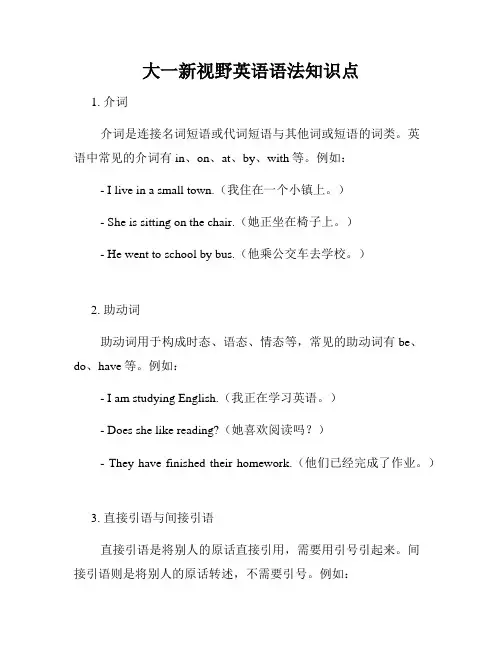
大一新视野英语语法知识点1. 介词介词是连接名词短语或代词短语与其他词或短语的词类。
英语中常见的介词有in、on、at、by、with等。
例如:- I live in a small town.(我住在一个小镇上。
)- She is sitting on the chair.(她正坐在椅子上。
)- He went to school by bus.(他乘公交车去学校。
)2. 助动词助动词用于构成时态、语态、情态等,常见的助动词有be、do、have等。
例如:- I am studying English.(我正在学习英语。
)- Does she like reading?(她喜欢阅读吗?)- They have finished their homework.(他们已经完成了作业。
)3. 直接引语与间接引语直接引语是将别人的原话直接引用,需要用引号引起来。
间接引语则是将别人的原话转述,不需要引号。
例如:- He said, "I love you."(他说:“我爱你。
”)- She told me that she loved me.(她告诉我她爱我。
)4. 被动语态被动语态表示主语是动作的承受者,常常由助动词be和及物动词的过去分词构成。
例如:- The book was written by Mark Twain.(这本书是马克·吐温写的。
)- The cake has been eaten by someone.(蛋糕已经被某人吃掉了。
)5. 并列句并列句由两个或多个相互独立的句子通过连词连接而成,连接词包括and、but、or等。
例如:- I like to read, and my brother likes to play sports.(我喜欢阅读,而我弟弟喜欢运动。
)- She is not here, but I will leave her a message.(她不在这里,但我会给她留个言。
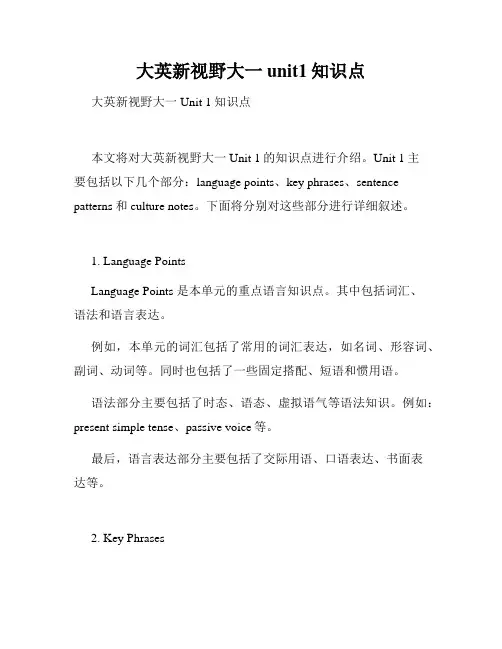
大英新视野大一unit1知识点大英新视野大一Unit 1知识点本文将对大英新视野大一Unit 1的知识点进行介绍。
Unit 1主要包括以下几个部分:language points、key phrases、sentence patterns和culture notes。
下面将分别对这些部分进行详细叙述。
1. Language PointsLanguage Points 是本单元的重点语言知识点。
其中包括词汇、语法和语言表达。
例如,本单元的词汇包括了常用的词汇表达,如名词、形容词、副词、动词等。
同时也包括了一些固定搭配、短语和惯用语。
语法部分主要包括了时态、语态、虚拟语气等语法知识。
例如:present simple tense、passive voice等。
最后,语言表达部分主要包括了交际用语、口语表达、书面表达等。
2. Key PhrasesKey Phrases 是本单元的重点短语。
通过掌握这些短语,能更好地理解和应用在实际生活或者学习当中。
例如:in addition、as a result、on the other hand等常用的关键短语。
3. Sentence PatternsSentence Patterns 是本单元的重点句型。
这些句型可以帮助学生提高语言表达的能力。
例如:It is + adj. + to do sth.、Not only...but also...等句型。
4. Culture NotesCulture Notes 是本单元的文化知识点。
通过了解和学习这些文化知识,可以更好地了解和理解英语国家的文化背景。
例如:英语国家的传统节日、习俗等。
在学习大英新视野大一Unit 1知识点时,可以通过阅读教材中的相关内容,积极参与课堂讨论和活动,或者通过参考外部资源进行拓展学习。
同时,可以结合练习题和模拟考试来检验自己的学习效果,及时总结和反思,提高英语学习的能力。
总结起来,大英新视野大一Unit 1知识点包括Language Points、Key Phrases、Sentence Patterns和Culture Notes。
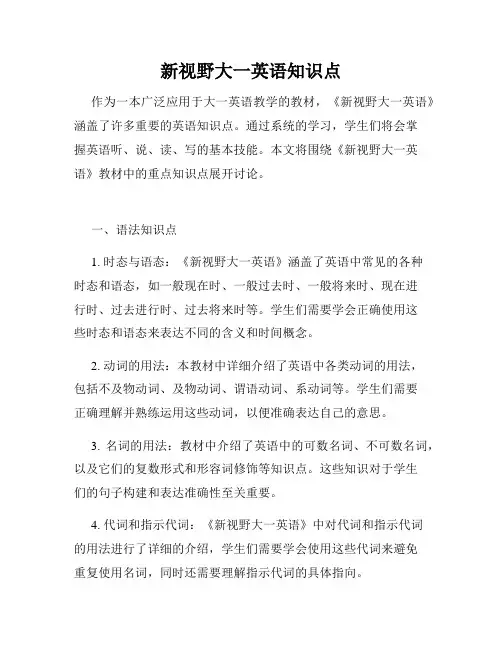
新视野大一英语知识点作为一本广泛应用于大一英语教学的教材,《新视野大一英语》涵盖了许多重要的英语知识点。
通过系统的学习,学生们将会掌握英语听、说、读、写的基本技能。
本文将围绕《新视野大一英语》教材中的重点知识点展开讨论。
一、语法知识点1. 时态与语态:《新视野大一英语》涵盖了英语中常见的各种时态和语态,如一般现在时、一般过去时、一般将来时、现在进行时、过去进行时、过去将来时等。
学生们需要学会正确使用这些时态和语态来表达不同的含义和时间概念。
2. 动词的用法:本教材中详细介绍了英语中各类动词的用法,包括不及物动词、及物动词、谓语动词、系动词等。
学生们需要正确理解并熟练运用这些动词,以便准确表达自己的意思。
3. 名词的用法:教材中介绍了英语中的可数名词、不可数名词,以及它们的复数形式和形容词修饰等知识点。
这些知识对于学生们的句子构建和表达准确性至关重要。
4. 代词和指示代词:《新视野大一英语》中对代词和指示代词的用法进行了详细的介绍,学生们需要学会使用这些代词来避免重复使用名词,同时还需要理解指示代词的具体指向。
二、阅读技巧与策略1. 快速阅读技巧:学习如何快速浏览一篇英文文章,掌握文章的主要内容和结构,并快速获取关键信息。
2. 阅读理解策略:通过教材中的阅读理解部分,学习如何精确理解英文文章,找出关键信息和主旨,提高阅读理解能力。
3. 词汇拓展:教材中的阅读部分包含了大量的生词和短语,学生们需要通过上下文推断词义,积累并拓展词汇量。
三、听力技巧1. 听取关键信息:教材中的听力材料包含了各种场景和对话,学生们需要通过倾听并区分信息的重要程度,准确捕捉关键信息。
2. 笔记记录:学生们需要学会在听力过程中做笔记,以帮助记忆并理解听到的内容。
四、口语表达与写作技巧1. 口语表达:教材中的口语部分提供了丰富多样的对话和问题,学生们可以通过模仿和练习来提高口语表达能力,包括正确的语音语调、流畅的口语表达等。
2. 写作技巧:教材中的写作部分给出了写作的指导和范文,学生们可以通过学习这些写作技巧和模板来提高英语写作水平。
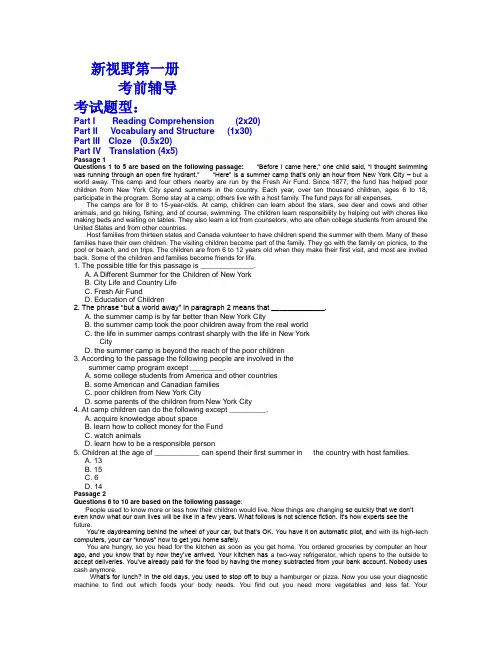
新视野第一册考前辅导考试题型:Part I Reading Comprehension (2x20)Part II Vocabulary and Structure (1x30)Part III Cloze (0.5x20)Part IV Translation (4x5)Passage 1Questions 1 to 5 are based on the following passage:“Before I came here,” one child said, “I thought swimming was running through an open fire hydrant.”“Here” is a summer camp that’s only an hour from New York City – but a world away. This camp and four others nearby are run by the Fresh Air Fund. Since 1877, the fund has helped poor children from New York City spend summers in the country. Each year, over ten thousand children, ages 6 to 18, participate in the program. Some stay at a camp; others live with a host family. The fund pays for all expenses.The camps are for 8 to 15-year-olds. At camp, children can learn about the stars, see deer and cows and other animals, and go hiking, fishing, and of course, swimming. The children learn responsibility by helping out with chores like making beds and waiting on tables. They also learn a lot from counselors, who are often college students from around the United States and from other countries.Host families from thirteen states and Canada volunteer to have children spend the summer with them. Many of these families have their own children. The visiting children become part of the family. They go with the family on picnics, to the pool or beach, and on trips. The children are from 6 to 12 years old when they make their first visit, and most are invited back. Some of the children and families become friends for life.1. The possible title for this passage is _____________.A. A Different Summer for the Children of New YorkB. City Life and Country LifeC. Fresh Air FundD. Education of Children2. The phrase “but a world away” in paragraph 2 means that _____________.A. the summer camp is by far better than New York CityB. the summer camp took the poor children away from the real worldC. the life in summer camps contrast sharply with the life in New YorkCityD. the summer camp is beyond the reach of the poor children3. According to the passage the following people are involved in thesummer camp program except ________.A. some college students from America and other countriesB. some American and Canadian familiesC. poor children from New York CityD. some parents of the children from New York City4. At camp children can do the following except _________.A. acquire knowledge about spaceB. learn how to collect money for the FundC. watch animalsD. learn how to be a responsible person5. Children at the age of ___________ can spend their first summer in the country with host families.A. 13B. 15C. 6D. 14Passage 2Questions 6 to 10 are based on the following passage:People used to know more or less how their children would live. Now things are changing so quickly that we don’t even know what our own lives will be like in a few years. What follows is not science fiction. It’s how experts see the future.You’re daydreaming behind the wheel of your car, but that’s OK. You have it on automatic pilot, an d with its high-tech computers, your car “knows” how to get you home safely.You are hungry, so you head for the kitchen as soon as you get home. You ordered groceries by computer an hour ago, and you know that by now they’ve arrived. Your kitchen has a two-way refrigerator, which opens to the outside to accept deliveries. You’ve already paid for the food by having the money subtracted from your bank account. Nobody uses cash anymore.What’s for lunch? In the old days, you used to stop off to buy a hamburger or pizza. Now you use your diagnostic machine to find out which foods your body needs. You find out you need more vegetables and less fat. Yourfood-preparation machine makes you a salad.After lunch, you go down the hall to your home office. Here you have everything you need for doing your work. Thanks to your information screen and your new computer, you almost never go into the office anymore.The information screen shows an urgent message from a co-worker in Brazil. You set the screen to translate Portuguese into English. As you wait, you think about later, when you’ll have a movie transmitted. What movie should you order tonight?6. According to the passage _____________.A. people were able to predict their own lives in the futureB. it’s difficult for people to predict the changes of their future livesC. people are used to predicting futureD. people used to know exactly what their children’s future would be lik e7. The possible changes in life mentioned in the passage cover the following aspects except _________.A. transportationB. foodC. medicineD. work8. It can be learned from the passage that in the future __________.A. you can drive safely home with the help of your carB. nobody will cook for themselvesC. people will pay for whatever they eat in advanceD. people will no longer eat hamburgers9. According to the passage, people will pay for what they buy____________.A. in cashB. through their bank accountC. by checkD. on credit10. From what the writer has said, we can see that ___________ will play the most important role in people’s lives in the future.A. the carB. the food-preparation machineC. the diagnostic machineD. the computerPassage 3Questions 11 to 15 are based on the following passage:For a long time women with HIV were ignored because the focus was totally on HIV men. The gay community was very much in sight and vocal (呼声高的) and successfully got support for its cause. Now we are rapidly approaching the point where about one half of all AIDS cases in the world are women. But no one is taking this dangerously high level of infection among women seriously enough.Women usually have a worse time dealing with HIV than men do. In most cases, the woman is taking care of children as well as her sick partner. She may not even have time to take care of herself. The HIV-positive woman ends up shouldering the family as well as her own personal problems. Men, however, are usually the ones who have insurance(保险), income and access to doctors. They get care. Women often do not.The discrimination (歧视) against HIV-positive women is simply terrible. They are likely to be more inactive than men in the home and workplace because too many people think that women are the cause of the disease. This is not at all true. They get it from a man. They don’t just simply have HIV. Of course, there’s a social discrimination against all people with HIV. They are scared that other people will know they are HIV-positive and that they will, therefore, be discriminated against. For example, it's very difficult for people with HIV to travel. They are not allowed to enter many countries, including the United States, China and Russia.The biggest difficulty an HIV-positive woman must face is the isolation (孤立). Once the woman knows she' s HIV-positive, she lives in fear that other people will find out. She' s so frightened she will go into hiding, into an isolated place by herself. It's not at all uncommon to meet a woman who has been HIV-positive for nearly 10 years and has never told anyone, except her doctor. And the resulting stress is enough to make her sick. But HIV-positive women who get support, who can discuss their trouble and then do something about it ------whether that means taking better care of themselves or going to the United Nations to struggle for their rights ------ are likely to live longer. Active women don't die out of shame in a corner. This happens to too many HIV-positive women.11. Women with HIV were ignored for a long time because________.A) their effort to attract attention was not as successful as the HIVB) they often lived in a community that was hardly noticed by othersC) HIV men were the only concern over a long timeD) they failed to get support12. Which of the following statements is not true?_________A) HIV-positive women make up nearly half of all AIDS cases in theworld.B) The gay community succeeded in getting support.C) The high level of infection among women has been taken seriously.D) There is social discrimination against all people with HIV.13. According to the passage, it's difficult for women to deal with HIVbut not because ________.A) they often lose their jobs after other people find out they are HIV-positiveB) they usually have the family problemC) they often have no access to doctorsD) they have little time left to take care of themselves14. Countries such as the United States and China are mentioned in the article in order to show that ________.A) there are more AIDS cases in those countriesB) it is not convenient for HIV-positive people to travelC) HIV-positive people are usually discriminated againstD) people who are HIV-positive are afraid that these countries will find out15. Which of the following does the passage show to us that active women don't do? _______A) Get support from others.B) Discuss their trouble with their doctors only.C) Struggle for their rights.D) Take better care of themselves.Questions 16 to 20 are based on the following passage:Like most people, I was brought up to look upon life as a process (过程) of getting. It was not until in my late thirties that I made this important discovery: giving-away makes life so much more exciting. You need not worry if you lack money. This is how I experimented with giving-away. If an idea for improving the window display (陈列) of a nearby store occurred to me, I stepped in and suggested it to the store-keeper. If something interesting happens, the story of which I think the local Catholic (天主教的) priest (神父) could use, I call him up and tell him about it, though I am not a Catholic myself.One discovery I made about giving away is that it is almost impossible to give away anything in this world without getting something back, though the return often comes in a form that is not expected. One Sunday morning the local post office delivered an important letter to my home, though it was addressed to me at my office. I wrote the post office manager a thank-you note. More than a year later I needed a post-office box for a new business I was starting. I was told at the window that there were no boxes left, and that my name would have to go on a long waiting list. As I was about to leave, the post office manager appeared in the entrance. He had happened to hear our conversation. "Wasn't it you that wrote us that letter a year ago about delivering a special envelope to your home?" I said it was. "Well, you certainly are going to have a box in this post office if we have to make one for you. You don't know what a letter like that means to us. We usually get nothing but complaints."16. The writer at first regarded life as a process of getting probably because __________.A) he was like most people in looksB) of most people around himC) he was educated to like most peopleD) of his early education17. Which of the following statements is true according to the passage?A) The writer liked most people brought up that way.B) He was educated to consider life as a process of getting in the same way as most people do.C) He discovered how important money was in his late thirties.D) He made some important discoveries after he was thirty.18. The writer suggested an idea to the storekeeper _________.A) in the store window B) in personC) about another store D) in a letter19. When the writer needed a post-office box, ____________.A) his name went on a waiting listB) he wrote the post office manager asking him to make one forC) there had been many people requesting post-office boxesearlier than himD) he wrote the post office manager to complain20. When answering the post office manager's question, the writersaid _________.A) it was heB) it was a post-office boxC) it was the important letter delivered to his homeD) it was the thank-you note he had written21. He felt ______ when he found he had difficulty with most of the math problem.A. frightenedB. terrifiedC. encouragedD. frustrated22.Writing is a slow process, requiring _________ thought, time and effort.A. significantB. considerableC. enormousD. numerous23. The speech which he made ________ the project has bothered me greatly.A .being concerned B. be concerned C. concerned D. concerning24. Psychologists find that one’s attention ___________ has a limit. So a break between classes is necessary.A. spaceB. spanC. timeD. period25. A well-written composition _______ good choice of words and clearorganization among other things.A. calls onB. calls forC. calls upD. calls offVocabulary and Structure26.You can go out, _________ you promise to be back before 11 o’clock.A. even though C. as far asB. ever since D. as long as27. We dare not play jokes on her ___________ she should become angry.A. lestB. unlessC. for fear ofD. so that28. She was, ___________ her fame and fortune, basically an unhappy woman.A. in spite C. in spite ofB. however D. even though29. A dark suit is ____________ to a light one for evening wear.A. preferableB. oppositeC. relativeD. respectable30. The harder a student studies, ____________________.A. the more his body gives off heatB. the more heat does his body gives offC. his body gives off more heatD. the more heat his body gives offVocabulary and Structure31. We agreed to accept _______ they thought was the best guide.A. whateverB. whomeverC. whicheverD. whoever32. Evidence came up ________ specific sounds are recognized by babies as young as 6 months old.A. ThatB. whatC. whichD. why33. The representative of the company seemed very _____ to the conditions of the workers.A. indifferentB. ignorantC. disinterestedD. careless34. She was, ___________ her fame and fortune, basically an unhappywoman.A. in spiteB. howeverC. in spite ofD. even though35. The newcomers found it impossible to _______ themselves to the climate sufficiently to make permanent homes in the new country.A. suitB. adaptC. regulateD. coordinateVocabulary and Structure36.We insisted that nations should be treated equal in international affairs___________ the size and stage of the economic development.A. on account ofB. regardless ofC. in relation toD. apart from37. It does not alter the fact that he was the man ____ for the death of the little girl.A. accountingB. guiltyC. responsibleD. obliged38.Over a third of the population was estimated to have no ___________ to the health service.A. assessmentB. assignmentC. exceptionD. access39. The old couple decided to ______ a boy and a girl though they had three children of their own.A. adaptB. bringC. receiveD. adopt40. Because a degree from a good university is the means to a better job, education is one of the most ______ areas in Japanese life.A. sophisticatedB. competitiveC. considerateD. superficial1.与以英语为母语的人交谈是非常有益的体验,从中我们能学到许多东西。


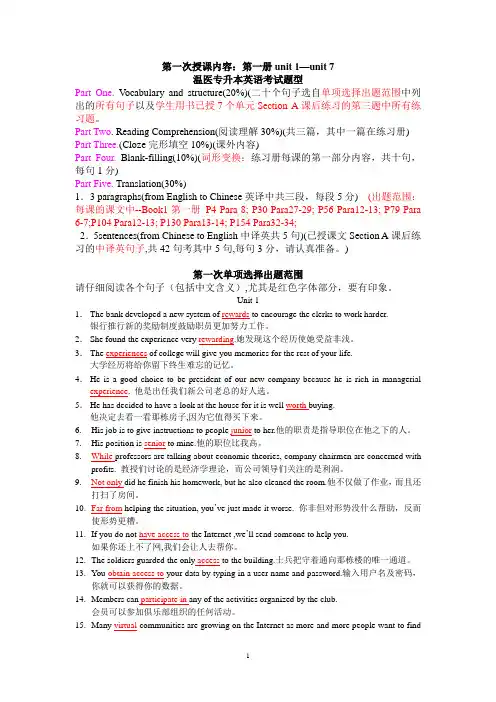
第一次授课内容:第一册unit 1—unit 7温医专升本英语考试题型Part One. V ocabulary and structure(20%)(二十个句子选自单项选择出题范围中列出的所有句子以及学生用书已授7个单元Section A课后练习的第三题中所有练习题。
Part Two. Reading Comprehension(阅读理解30%)(共三篇,其中一篇在练习册) Part Three.(Cloze完形填空10%)(课外内容)Part Four. Blank-filling(10%)(词形变换:练习册每课的第一部分内容,共十句,每句1分)Part Five. Translation(30%)1.3 paragraphs(from English to Chinese英译中共三段,每段5分) (出题范围:每课的课文中--Book1第一册P4 Para 8; P30 Para27-29; P56 Para12-13; P79 Para 6-7;P104 Para12-13; P130 Para13-14; P154 Para32-34;2.5sentences(from Chinese to English中译英共5句)(已授课文Section A课后练习的中译英句子,共42句考其中5句,每句3分,请认真准备。
)第一次单项选择出题范围请仔细阅读各个句子(包括中文含义),尤其是红色字体部分,要有印象。
Unit 11.The bank developed a new system of rewards to encourage the clerks to work harder.银行推行新的奖励制度鼓励职员更加努力工作。
2.She found the experience very rewarding.她发现这个经历使她受益非浅。
3.The experiences of college will give you memories for the rest of your life.大学经历将给你留下终生难忘的记忆。
新视野英语教程第一册教案cation n.(尤指正规的)教育;学业;培养[例]higher education高等教育[例] She has had a good education. 她受过良好的教育。
拓展:educate v. educated adj.[例]well-educated2.business n. 1). [U] 职责;关心的事;任务[例] A student's business is to learn. 学生的本分是学习。
[例] none of your business与你无关[例] Mind your own business. 不要多管闲事。
[例] He is out on business.他出差了。
2). [U] 商业;交易;生意[例] She wants to go into business when sheleaves college.她大学毕业后想经商。
[例] I'm here on business. 我是来谈生意的。
[例] Business is business. 公事就是公事(公事公办)。
3). money-earning activity or place 商店,企业,公司[例] He sold his business last month.3.extent n.(singular) a stated degree 程度;限度[例] I agree with what he said to some extent 在某种程度上a certain extent相当程度上alarge extent很大程度上[例]I was surprised at the extent of the scientist’s knowledge.我对这位科学家渊博的知识感到惊讶。
4.whatever1). any(thing) at all that 任何;什么……都[例] They eat whatever (food) they can find.他们找到什么(吃的)就吃什么。
《大学英语1(新视野1)》20080315考前辅导资料考试方式及试题类型一、考试方式:闭卷。
二、考试时间:120分钟。
三、试题类型、数量及分值:1、单项选择题,每小题1分,共30小题、共30分;2、完型填空题,每小题1分,共20小题、共20分;3、阅读理解题,共三篇文章,每篇文章5个小题,每小题2分,共15小题、30分;4、中译英句子翻译题,每小题2分,共5题,共10分;5、写作题,共1题,共10分;复习指导单项选择题的复习指导一、答题技巧:单项选择题目主要考察对新视野第一册一至六单元所覆盖的知识点,其中包括每个单元两篇主课文中涉及的重点词汇和语法点,也包括课后练习中涉及到的知识点,如词汇填空练习,句子翻译练习以及写作格式指导练习等。
二、复习重点与难点:复习的重点应该放在一至六单元中A和B课文中的黑体词汇、重点短语和重点语法结构。
其中,词汇部分要注意理解并完全把握该重点词汇在本篇文章中出现时的特定意义以及在该相同语境下产生的意义;其次还要注意与其它词形相似、但意义不同,或意义有相似之处的词汇之间的区别。
语法部分主要是课文中某个句子所采用的语法结构,重点放在六大从句(状语从句,定语从句,表语从句,名词性从句如主语从句,宾语从句,同谓语从句等);虚拟语气,非谓语动词(包括动名词,分词和不定式),名词的用法,形容词的比较级和最高级,结构一致等。
三、练习题、分析及答案:1.It was said that some of them strongly attacked their ____ friends.A formerB forthC beforeD forward句中需要填写的是一个形容词,其中A former是形容词,表示“从前的,以前的”; B forth 是副词,表示“向前,向前方”; C before 是adv. 和prep. ,表示“在…前面;在前头”;D forward可用做形容词,表示“前部的,先进的,早熟的;”;所以A最符合题意。
大学英语第一册UNIT ONE填空1. The years he spent in the countryside proved to be a(n) rewarding(有益的)experience.2. You can learn a lot from this online course. It is designed to help people communicate better through speech and writing.3. Over a third of the population was estimated(被估计)to have no access to health service.4. Asking too many personal questions during an interview can lead to a(n) embarrassing(令人尴尬的)situation.5. Don't just complain about what's wrong with it; suggest some ____ ways to solve the problem. positive6. No one in the class could match John's hard work and commitment to (致力于)study, which is why the professor liked him.7. The Web site allows you to take a(n) ____ tour of the well-known city which was there about2,000 years ago.Virtual(虚拟的)8. Those who dare not answer questions in traditional classroom can easily enjoy the ____ of online courses.benefits9. He couldn't join the police because he was below(低于)the ____ height allowed by the rules. Minimum(最小的)10. Many new ____ will be opened up in the future for those with a university education. opportunities完型Good is the key to success when learning online. You should take the opportunity to get to know your teacher and classmates through email and by participating in Internet discussions. This will lead to a more positive and __1__ learning experience.It's true that learning the technology needed to take part in a class can at times be __2__. For example, you may need to ask how to __3__ your assignment(功课)on the Web. But, don't worry! If you have a problem, ask for help. There's no such thing as a stupid(愚蠢)question, so there is no need to be intimidated(害怕)or __4__. Sharing __5__ and answers freely is what makes the Internet such a great medium for learning.Online classroom teacher Mike Roberts was asked about what he thought the greatest __6__ of online learning is. "As a teacher, I need the students to ask questions so that I know what areas of my lessons need further __7__. That's what is great about teaching and learning over the Internet. In an ordinary classroom, time is limited, so students seem to ask the __8__ amount of questions possible. But in the __9__ classroom, students are always asking questions. They really seem to feel __10__ asking me for the information that they need. They also share a lot of valuable ideas with each other in a way that you don't usually see in a regular classroom."1. rewarding2. Frustrating(令人泄气)3. post4. Embarrassed(尴尬)5. insights6. benefit7. explanation8. minimum9. virtual10. comfortable翻译1、对于网络课程,学生不仅可以选择何时何地学习,在回答问题之前他们还可以有时间思考答案。
大一新视野大学英语知识点新视野大学英语是中国高校普遍采用的一套教材,涵盖了大量的英语知识点,从基础语法到高级阅读都有涉及。
本文将以大一新视野大学英语中的知识点为主题,进行整理和介绍。
1. 语法知识点1.1 时态和语态:英语中时态和语态是表达动作和状态的重要方式,包括一般现在时、一般过去时、现在进行时、过去进行时、将来时、被动语态等。
1.2 名词和代词:介绍名词的单复数形式、可数与不可数名词、物主代词、反身代词等。
1.3 形容词和副词:细分形容词和副词的用法,如比较级和最高级、修饰物体和人的不同用法等。
1.4 介词和连词:介绍在句子中连接词组和从句的作用,包括常见的介词和连词的用法和搭配。
1.5 动词和动词短语:详细介绍英语中各类动词的用法,如实义动词、情态动词、不定式和动名词等。
2. 句子结构2.1 主谓结构:介绍句子的基本结构,即主语和谓语的构成和使用方法。
2.2 并列句和复合句:分别介绍并列句和复合句的构成和变化,以及使用方法。
2.3 简单句和复杂句:详细解释简单句和复杂句的概念和特点,提供例句进行说明。
3. 阅读和理解3.1 阅读技巧:指导学生如何提高阅读速度和理解能力,包括快速扫读和细节理解的方法。
3.2 阅读题型:介绍常见的阅读题型,如主旨题、细节题、推断题等,并提供解题技巧。
3.3 阅读材料:选取适合初级英语学习者的短文进行解析和阐释,帮助学生更好地理解文本。
4. 写作技巧4.1 写作结构:介绍论述文、说明文和议论文的基本结构,包括引言、主体和结论的写作方法。
4.2 写作素材:提供常见的写作话题,如环境保护、科技进步等,帮助学生扩展词汇和表达能力。
4.3 写作表达:指导学生如何运用各类句型和连接词,使文章结构紧凑、观点清晰。
5. 听力技巧5.1 听力材料:选取适合初级英语学习者的听力材料,包括对话和短文,提供听力练习的机会。
5.2 听力策略:介绍听力时的注意事项和技巧,如预测信息、精听关键词等。
大一英语新视野知识点汇总在大一的英语学习中,掌握并运用好新视野教材中的知识点对于提升英语水平至关重要。
下面将结合各个单元的重点内容,对新视野教材中的知识点进行汇总,帮助大家更好地学习和理解。
第一单元:学术生活1. 介绍自己和他人在学术生活中,我们经常需要介绍自己和他人。
在介绍自己时,可以使用表达个人信息如姓名、年龄、爱好等的句子结构。
同时,在介绍他人时,可以运用一般现在时和人称代词的用法。
2. 职业规划学术生活中,了解职业规划是非常重要的。
学习如何描述理想职业、职业要求以及个人适合的职业类型等知识,有助于我们制定个人发展计划并更好地规划未来。
3. 学术讨论与辩论在学术生活中,我们经常需要进行学术讨论和辩论。
掌握关于表达观点、提出建议和反驳等方面的表达方法,可以帮助我们更好地参与到学术交流中,提高自己的表达能力。
第二单元:大学教育1. 学校设施和服务在大学教育中,学校的设施和服务对于学生的学习和生活起着重要的作用。
学习如何询问和提供相关信息,比如教室、图书馆、体育馆、餐厅等的位置和开放时间,对于适应大学环境很有帮助。
2. 学习技巧与方法大学教育中,学习技巧和方法的掌握对于学习效果至关重要。
了解如何制定学习计划、使用学习资源以及运用各种学习策略等,可以帮助我们更高效地学习和掌握知识。
3. 使用电子设备和网络大学教育中,电子设备和网络的使用已经成为了学习和生活的一部分。
学习如何使用电子设备、浏览网页、发送电子邮件等基本操作,能够更好地与他人进行沟通和信息交流。
第三单元:国际交流1. 旅行与交通方式国际交流中,旅行和交通方式的选择是重要的。
学习如何询问和提供关于旅行计划、交通工具选择和出行路线等方面的信息,对于国际交流者的日常生活和出行都非常实用。
2. 文化差异与适应在国际交流中,了解不同文化之间的差异是必要的。
学习如何描述和比较不同国家或地区的文化、饮食、习俗等,有助于我们更好地适应和融入到国际环境中。
第一次授课内容:第一册unit 1—unit 7温医专升本英语考试题型Part One. V ocabulary and structure(20%)(二十个句子选自单项选择出题范围中列出的所有句子以及学生用书已授7个单元Section A课后练习的第三题中所有练习题。
Part Two. Reading Comprehension(阅读理解30%)(共三篇,其中一篇在练习册) Part Three.(Cloze完形填空10%)(课外内容)Part Four. Blank-filling(10%)(词形变换:练习册每课的第一部分内容,共十句,每句1分)Part Five. Translation(30%)1.3 paragraphs(from English to Chinese英译中共三段,每段5分) (出题范围:每课的课文中--Book1第一册P4 Para 8; P30 Para27-29; P56 Para12-13; P79 Para 6-7;P104 Para12-13; P130 Para13-14; P154 Para32-34;2.5sentences(from Chinese to English中译英共5句)(已授课文Section A课后练习的中译英句子,共42句考其中5句,每句3分,请认真准备。
)第一次单项选择出题范围请仔细阅读各个句子(包括中文含义),尤其是红色字体部分,要有印象。
Unit 11.The bank developed a new system of rewards to encourage the clerks to work harder.银行推行新的奖励制度鼓励职员更加努力工作。
2.She found the experience very rewarding.她发现这个经历使她受益非浅。
3.The experiences of college will give you memories for the rest of your life.大学经历将给你留下终生难忘的记忆。
4.He is a good choice to be president of our new company because he is rich in managerial experience. 他是出任我们新公司老总的好人选。
5.He has decided to have a look at the house for it is well worth buying.他决定去看一看那栋房子,因为它值得买下来。
6.His job is to give instructions to people junior to her.他的职责是指导职位在他之下的人。
7.His position is senior to mine.他的职位比我高。
8.While professors are talking about economic theories, company chairmen are concerned withprofits. 教授们讨论的是经济学理论,而公司领导们关注的是利润。
9.Not only did he finish his homework, but he also cleaned the room.他不仅做了作业,而且还打扫了房间。
10.Far from helping the situation, you’ve just made it worse. 你非但对形势没什么帮助,反而使形势更糟。
11.If you do not have access to the Internet ,we’ll send someone to help you.如果你还上不了网,我们会让人去帮你。
12.The soldiers guarded the only access to the building.士兵把守着通向那栋楼的唯一通道。
13.You obtain access to your data by typing in a user name and password.输入用户名及密码,你就可以获得你的数据。
14.Members can participate in any of the activities organized by the club.会员可以参加俱乐部组织的任何活动。
15.Many virtual communities are growing on the Internet as more and more people want to findnew ways to make friends. 许多虚拟社区出现在因特网上,因为越来越多的人想通过新的方式交朋友。
16.The king was so much under the control of his wife that she was the virtual ruler of thecountry.国王完全被他的妻子控制,他的妻子才是这个国家的实际统治者。
17.It’s important to keep up with the changes of the time.跟上时代的变化十分重要。
18.The release of these secret documents has embarrassed the administration.这些机密材料的泄露使行政管理部门十分尴尬。
19.It was embarrassing that I couldn’t remember his name. 好尴尬—我不记得他的名字了。
20.Let it go, he thought. He didn’t feel like arguing.顺其自然吧,他想。
他不想争辩。
21.The young man would get nervous every time he came across a girl.那个年轻人每次遇到女孩子就紧张。
22.The program is bringing benefits to the farmers.这一计划正在使农民受益。
23.Critics argue that the tax cuts will only benefit large companies.批评人士称减税只能使大公司受益。
24.Studying science gave me great insights into natural law.学习科学知识使我对自然规律有了深刻的了解。
25.Now that John has arrived, we can begin our class.既然约翰来了,我们可以开始上课了。
26.With the introduction of the Internet, we can reach out to our friends by e-mail.由于互联网的使用,我们可以通过电子邮件和朋友联系。
27.You must reach out for any opportunity that comes your way.你必须抓住所遇到的任何机遇。
28.He reached for the phone and dialed the number. 他伸手拿起电话,拨了号码。
29.Learning a foreign language helps us bridge the gap between two different cultures.学习外语有助于缩小不同文化间的差距。
Unit 21.The doctor expressed serious concern about her health.医生对她的健康表示担忧。
2.How much money I earn is none of your concern.我挣多少钱与你无关。
3.What concerns the experts most is the increasing level of pollution in our cities.令专家最为担忧的是城市的污染日趋严重。
4.Tonight’s program concerns the effects of the law on ordinary people.今晚的节目是有关法律对普通大众的影响的。
5.I’ll go along with you no matter where you travel.无论你到哪儿旅游,我都和你一起去。
6. A strange man burst into the house.一个陌生人闯进了房子。
7.She burst into tears.她突然哭了起来。
8.I have told them over and over again, so they should know what to do.我给他们说了好多次了,他们该知道做什么。
9.She did go to see the doctor yesterday. 她昨天的确去看病了。
10.He reached for the remote control and press ed the “play” button.他伸手去拿遥控器,按了“播放”键。
11.Please turn up the TV. I’d like to hear the news. 把电视机音量调大点,我想听听新闻。
12.Please turn the radio down. I’m trying to sleep.请把收音机关小点声,我想睡觉了。
13.She had little for breakfast, as usual. 像往常一样,她早餐吃得很少。
14.When you are done, give us a call. 等你干完了,给我们打个电话。
15.I didn’t know you cared that much. 我不知道你那么在乎。
16.You can’t have this much for breakfast. 早餐你不能吃这么多。
17.I’m old-fashioned when it comes to music.在音乐方面,我是守旧的。
18.Long hair was in fashion some years ago, but people like short hair now.长发几年前很时髦,但现在人们喜欢留短发。
19.Long hair is out of fashion now, but it may be popular again in the future.长发如今不时髦了,但将来可能会再流行。